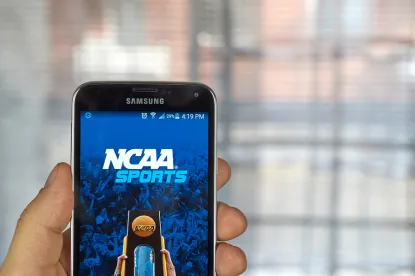“If you put something at risk (such as cash, entry fee, dinner, or other tangible item) on any amateur and/or professional sporting event with a chance to win something in return, you violate NCAA sports wagering rules.”[1]
Once the Supreme Court ruled unconstitutional the federal law[2] prohibiting sports betting in Murphy v. Nat’l Collegiate Athletic Ass’n,[3] states quickly enacted legislation to permit this type of betting. Today, 33 states (and the District of Columbia) permit sports betting either through retail or online sportsbooks. Four additional states have legalized sports betting but have not yet set up official sportsbooks (Florida, Kentucky, Maine, and Nebraska) while Texas and Vermont have active legislation to legalize sports betting. The remaining 11 states do not permit sports betting.[4]
Notably, four professional sports leagues[5] were named plaintiffs in the underlying district court case in Murphy seeking to prevent New Jersey’s attempt to legalize sports betting. Yet these four leagues—the NBA, NFL, NHL, and MLB—have since announced partnerships with official sports betting entities while also implementing reasonable rules for players, coaches, and staff.[6] Despite the acceptance of sports betting by the leagues that initially sought to prevent it, the National Collegiate Athletic Association (NCAA) remains steadfast in its rules prohibiting athletes, coaches, and collegiate athletics employees from placing bets on any sport sponsored by the NCAA at any level.[7]
The website “dontbetonit.org” (cited in anti-sports betting materials published by the NCAA) leads directly back to a page on the NCAA’s main website. The warning is unambiguous:
NCAA rules prohibit participation in sports wagering activities and from providing information to individuals involved in or associated with any type of sports wagering activities concerning intercollegiate, amateur, or professional athletics competition. Sports wagering has the potential to undermine the integrity of sports contests and jeopardizes the well-being of student-athletes and the intercollegiate athletics community. It also demeans the competition and competitors alike by spreading a message that is contrary to the purpose and meaning of ‘sport.’ Sports competitions should be appreciated for the inherent benefits related to participation of student-athletes, coaches, and institutions in fair contests, not the amount of money wagered on the outcome of the competition.[8]
Given the widespread acceptance of sports betting, and the NCAA’s refusal (to date) to modify its rules against sports betting, colleges, and universities must develop a program for athletes, coaches, and athletic department employees (paid and unpaid) to ensure compliance with all NCAA regulations prohibiting sports betting. This program must also include non-athletics department employees with responsibilities within or over the athletics department such as the chancellor/president, faculty advisors, and school administrators.[9] The risks of non-compliance are substantial: the NCAA will likely consider anything related to sports betting as a “Severe Breach of Conduct (Level I Violation)” as set forth in the 2022-23 NCAA Division I Manual (the NCAA Manual).[10] While sports betting is not specifically mentioned in NCAA Bylaw 19.1.1, it defines a severe breach of conduct as “One or more violations that seriously undermine or threaten the integrity of the NCAA Collegiate Model.”
For schools competing within the NCAA’s Division I, members support nine Commitments to the Division I Collegiate Model:[11]
- The Commitment to Value-Based Legislation
- The Commitment to Amateurism
- The Commitment to Fair Competition
- The Commitment to Integrity and Sportsmanship
- The Commitment to Institutional Control and Compliance
- The Commitment to Student-Athlete Well-being
- The Commitment to Sound Academic Standards
- The Commitment to Responsible Recruiting Standards
- The Commitment to Diversity and Inclusion.
Two commitments stand out in connection with the NCAA’s prohibitions against sports betting. “The Commitment to Integrity and Sportsmanship” states:
It is the responsibility of each member institution to conduct its athletics programs and manage its staff members, representatives, and student-athletes in a manner that promotes the ideals of higher education and the integrity of intercollegiate athletics. . . . All individuals associated with intercollegiate athletics programs and events should adhere to such fundamental values as respect, fairness, civility, honesty, responsibility, academic integrity, and ethical conduct.[12]
And “The Commitment to Institutional Control and Compliance” states: “It is the responsibility of each member institution to monitor and control its athletics programs, staff members, representatives, and student-athletes to ensure compliance with the Constitution and [Operating] bylaws of the [NCAA].”[13]
Colleges and universities must have a program in place to educate all relevant individuals about sports betting so that they can demonstrate to the NCAA good-faith efforts of its “Commitment to Institutional Control and Compliance.” But in addition to conducting the necessary training, these educational institutions should also have a contingency plan to implement if sports betting allegations are raised. Recent events suggest that state regulators are the first to become aware of questionable betting activity, forcing schools to respond quickly and without significant time to evaluate the facts.
For example, in Ohio, the Casino Control Commission governs sports betting in the state. After suspicious bets were placed in Ohio on a baseball game between the University of Alabama and Louisiana State University on Friday, April 28, 2023, the Ohio Casino Control Commission halted betting on games involving Alabama’s baseball team on the following Monday.[14] By Thursday, May 4, 2023, the University of Alabama announced that it began termination proceedings against the baseball coach, who may have placed bets against his own team.[15]
On May 8, 2023, the University of Iowa announced that it received—just six days earlier—information about 111 individuals that may have engaged in “potential criminal conduct related to sports wagering that also suggested possible NCAA violations.”[16] Iowa State University personnel are also under investigation.[17] The Iowa Racing and Gaming Commission has regulatory authority over sports betting in the state, but the Iowa Division of Criminal Investigation’s Special Enforcement Operations Bureau is leading the investigation of Iowa and Iowa State.[18] The specific nature of the state’s investigation has not been disclosed, however, individuals subject to the NCAA’s prohibition against sports betting are now under criminal investigation for violations of state law related to sports betting, and both schools now have “an affirmative obligation to report all instances of noncompliance to the [NCAA] in a timely manner.”[19]
If the NCAA commences its own investigation, NCAA Bylaw 19.2.3 mandates a “Responsibility to Cooperate.” The NCAA does not have subpoena power, but NCAA Bylaw 19.2.3 is essentially the functional equivalent:
Institutions, current and former institutional staff members, and prospective and enrolled student-athletes of member institutions have an affirmative obligation to cooperate . . . Full cooperation includes, but is not limited to:
(a) Affirmatively reporting instances of noncompliance to the Association in a timely manner and assisting in developing full information to determine whether a possible violation has occurred and the details thereof;
(b) Timely participation in interviews and providing complete and truthful responses;
(c) Making a full and complete disclosure of relevant information, including timely production of materials or information requested, and in the format requested;
(d) Disclosing and providing access to all electronic devices used in any way for business purposes;
(e) Providing access to all social media, messaging, and other applications that are or may be relevant to the investigation;
(f) Preserving the integrity of an investigation and abiding by all applicable confidentiality rules and instructions; and
(g) Instructing legal counsel and/or other representatives to also cooperate fully.
In just five years since Murphy, sports betting has become mainstream and, going forward, the number of inquiries by sports betting regulators will certainly increase. While the NBA, NFL, NHL, and MLB have accepted sports betting as part of their respective business models, the NCAA has not. Colleges and universities should be prepared for the risks associated with the commencement of an investigation by sports betting regulators or, more seriously, criminal investigations of athletes, coaches, and other athletic department employees. Institutions must be well-positioned to address both their own exposure in a government investigation and any potential violations of NCAA regulations.
[1] https://ncaaorg.s3.amazonaws.com/ncaa/wagering/WAGER_DontBetOnItWhatSANeedToKnow.pdf
[2] Professional and Amateur Sports Protection Act, 28 U.S.C. § 3701 et seq.
It shall be unlawful for—
(1) a governmental entity to sponsor, operate, advertise, promote, license, or authorize by law or compact, or
(2) a person to sponsor, operate, advertise, or promote, pursuant to the law or compact of a governmental entity,
a lottery, sweepstakes, or other betting, gambling, or wagering scheme based, directly or indirectly (through the use of geographical references or otherwise), on one or more competitive games in which amateur or professional athletes participate, or are intended to participate, or on one or more performances of such athletes in such games.
28 U.S.C. § 3702.
[3] 138 S. Ct. 1461 (2018).
[4]Alabama, Alaska, California, Georgia, Hawaii, Idaho, Minnesota, Missouri, Oklahoma, South Carolina, and Utah.
[5] National Basketball Association (“NBA”), National Football League (“NFL”), National Hockey League (“NHL”), and the Office of the Commissioner of Baseball, doing business as Major League Baseball (“MLB”).
[6] Even though all four leagues have official partnerships with sports betting entities, the NBA, NFL, NHL and MLB strictly prohibit their players from betting on any game in their respective leagues.
[7] NCAA Bylaws 10.3 and 10.3.1, 2022-23 NCAA Division I Manual, effective August 1, 2022. The NCAA also prohibits sharing information for sports betting purposes. Bylaw 10.3.
[8] https://www.ncaa.org/sports/2016/4/29/sports-wagering.aspx (emphasis added).
[9] NCAA Bylaw 10.02.1.
[10] NCAA Bylaw 19.1.1.
[11] NCAA Manual, at xiii.
[12] Id.
[13] Id.
[14] https://www.cleveland.com/news/2023/05/ohio-regulators-prohibit-betting-on-university-of-alabama-baseball-over-potential-integrity-issue.html
[15] https://www.cleveland.com/betting/2023/05/a-suspicious-sports-bet-was-placed-in-ohio-and-a-college-coach-in-alabama-got-fired.html
[16] https://osc.uiowa.edu/sports-wagering-investigation
[17] https://www.si.com/college/2023/05/09/iowa-iowa-state-betting-scandal-what-we-know-so-far
[18] Id.
[19] NCAA Bylaw 19.2.2.




 />i
/>i

